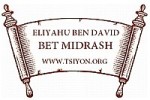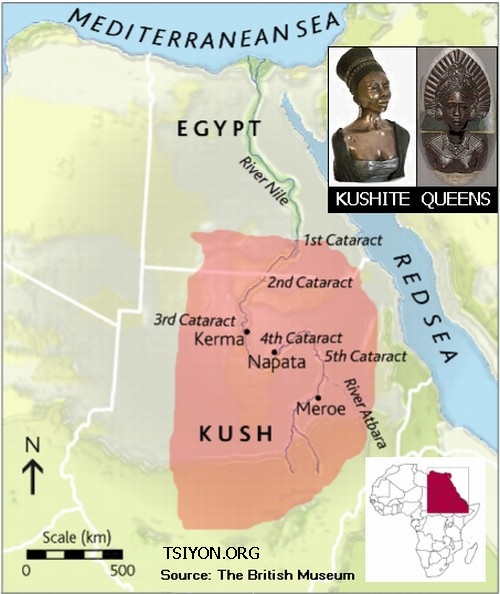Need to talk to us? - In the USA and Canada just call us toll free at (888) 230-2440 for help. Internationally, email us and we will arrange a phone or Skype call for you.
From Eliyahu
Hello friends,
Many people have been curious about the "Ethiopian (Heb. Kushite) woman" Moses is reported in Bamidbar/Numbers 12 to have married. We are presenting a teaching on this fascinating chapter of Torah in our latest Midrash which explains, among other things, that Kush was an ancient African kingdom located south of Eqypt (see map above), from which Moses' second wife originated. However, in doing research for this program I was reminded of something else I thought was fascinating: The Kushite wife of Moses is not the only Kushite woman to be mentioned in the Scriptures. Another Kushite woman is mentioned in passing, in the Book of Acts. The relevant passage is an account about Phillip the evangelist. I have always loved this story, and now that I see this Kushite connection more clearly I love it even more.
You're going to love this too! Here is the entire story:
Phillip and the Ethiopian (i.e. Kushite) Eunuch
..An angel of the Lord spoke to Philip, saying, “Arise, and go toward the south to the way that goes down from Jerusalem to Gaza. This is a desert.”
He arose and went; and behold, there was a man of Ethiopia, a eunuch of great authority under Candace, queen of the Ethiopians, who was over all her treasure, who had come to Jerusalem to worship. He was returning and sitting in his chariot, and was reading the prophet Isaiah.
The Spirit said to Philip, “Go near, and join yourself to this chariot.”
Philip ran to him, and heard him reading Isaiah the prophet, and said, “Do you understand what you are reading?”
He said, “How can I, unless someone explains it to me?” He begged Philip to come up and sit with him. Now the passage of the Scripture which he was reading was this,“He was led as a sheep to the slaughter.The eunuch answered Philip, “Who is the prophet talking about? About himself, or about someone else?”
As a lamb before his shearer is silent,
so he doesn’t open his mouth.
In his humiliation, his judgment was taken away.
Who will declare His generation?
For his life is taken from the earth.”
Philip opened his mouth, and beginning from this Scripture, preached to him Y'shua.
As they went on the way, they came to some water, and the eunuch said, “Behold, here is water. What is keeping me from being immersed?”
He commanded the chariot to stand still, and they both went down into the water, both Philip and the eunuch, and he immersed him.
When they came up out of the water, the Spirit of the Lord caught Philip away, and the eunuch didn’t see him any more, for he went on his way rejoicing. Act 8:26-39
The Ethiopian (i.e. Kushite) Eunuch in this story "had come to Jerusalem to worship" - which means he was an African convert to the Jewish faith, who worshiped at the Temple of YHWH. Since he was a man of great influence and responsibility in his nation of origin, we would expect that there were many other African converts like him who periodically worshiped at Jerusalem. Further, he was a highly educated man, with his own copy of the Scroll of Isaiah, which he was reading and studying. This is very impressive, since, so far as we know, most Jews of that time did not own a personal copy of the Scriptures, but instead studied the Scriptures at the synagogue.
The thing about this story that I have always found exciting is how quickly this man came to faith in Y'shua. As soon as he saw how Y'shua fit into the truth of Scripture that he already knew as a Jewish proselyte, he believed and was ready to follow Messiah, so was immediately immersed. This illustrates for us how vital the "Jewish roots" of the faith really were in the spread of the good news in the first century. With this account he became the first Messianic believer of African descent specifically reported in Scripture. No doubt, he soon spread the good news about Messiah to many of his African country-men as well.
Candace, queen of the Ethiopians (Kushites), is mentioned in the story as being the eunuch's boss. Who was Queen Candace? The Scripture says nothing more. However, history and recent archeological discoveries show "Candace" to be equivalent to "Kandake" - the royal title of the queens of Kush, much like the term "Pharoah" was used as the royal title of the kings of Egypt. In other words, Candace is not a proper name, but is more like saying "the President." Some think this Candace became a believer and financed the significant spread of the Good News throughout the Kushite Kingdom. To give you a better picture, I have included quotes from some of the commentaries about her.
The International Standard Bible Encyclopedia:
CANDACE
kan'-da-se (Kandake):
Queen of the Ethiopians (Acts 8:27). Pliny states that the name Candace had already been borne for many years by the queens of Ethiopia (vi, 29). See ETHIOPIA. Her treasurer, "a eunuch of great authority," was baptized by Philip the Evangelist on his return from worshiping in Jerusalem.Strong's Concordance:
2582. Kandake -- Candace, a queen of Ethiopia
Candace, a queen of Ethiopia.
Part of Speech: Noun, Feminine Transliteration: Kandake
Phonetic Spelling: (kan-dak'-ay)
ATS Bible Dictionary:
The name of an Ethiopian queen, whose high treasurer was converted to Christianity under the preaching of Philip the evangelist, Acts 8:27. The Ethiopia over which she ruled was not Abyssinia, but that region of Upper Nubia called by the Greeks Meroe; and is supposed to correspond with the present province of Atbara, lying between thirteen and eighteen degrees north latitude. Extensive ruins found in this neighborhood, and along the upper valley of the Nile, indicate high civilization among the ancient Ethiopians. Pliny and Strabo inform us that for some time before and after the Christian era, Ethiopia Proper was under the government of female sovereigns, who all bore the appellation of Candace. Irenaeus and Eusebius ascribe to Candace's minister her own conversion to Christianity, and the promulgation of the gospel through her kingdom.Easton's Bible Dictionary:
The Queen of the Ethiopians whose "eunuch" or chamberlain was converted to Christianity by the instrumentality of Philip the evangelist (Acts 8:27). The country which she ruled was called by the Greeks Meroe, in Upper Nubia. It was long the centre of commercial intercourse between Africa and the south of Asia, and hence became famous for its wealth (Isaiah 45:14). It is somewhat singular that female sovereignty seems to have prevailed in Ethiopia, the name Candace (compare "Pharaoh, " "Ptolemy," "Caesar") being a title common to several successive queens. It is probable that Judaism had taken root in Ethiopia at this time, and hence the visit of the queen's treasurer to Jerusalem to keep the feast. There is a tradition that Candace was herself converted to Christianity by her treasurer on his return, and that he became the apostle of Christianity in that whole region, carrying it also into Abyssinia. It is said that he also preached the gospel in Arabia Felix and in Ceylon, where he suffered martyrdom. (see PHILIP.)
Kushite women, exemplified by the Kushite Candaces, such as the one mentioned in Acts, were known to be both capable and assertive. These traits of Moses' new wife may have played some role in the insubordination of Miriam and Aaron, as reported in Bamidbar/Numbers 12. Listen to the program for further details.
Blessings and Shalom,
Eliyahu Ben David
PS - I've included an article below about a notable Kushite Kandake, that may give you a sense of just how formidable Kushite women could be.
________________________________________________________
Queen Amanirenas Of Kush, Conqueror Of Roman Armies
Reprint from: Kimberly Wilson, Oct 7, 2014
 The
outstanding bravery of Queen Amanirenas of the Ancient Ethiopian Kingdom of Kush
prevented the Romans from annexing the territory into their empire.
The
outstanding bravery of Queen Amanirenas of the Ancient Ethiopian Kingdom of Kush
prevented the Romans from annexing the territory into their empire.
She was arguably the only female in history who heavily defeated the Romans.
Though the full extent of Queen Amanirenas’ humiliation of the Romans is yet to
be fully decoded from Ancient Ethiopia’s Meroitic language, her heroic deeds
will linger forever.
Candace Amanirenas was one of the greatest kandakes (Queen Mothers) who ruled
over Ancient Ethiopia’s Kingdom of Kush (40 BC to 10 BC) after the death of her
husband, King Teriteqas.
Akinidad, son of Amanirenas, succeeded king Teriteqas when he died in 24 BC. But
Amanirenas was invariably in charge. Her authority as Queen mother of Kush was
displayed in the series of wars that followed.
At the time, Kush’s neighbor Egypt was already a Province of the Roman Empire,
with Augustus Caesar being master of Rome and its territories. However, Kush was
an independent state.
An attempt by the Romans to annex and impose a heavy tax on the Kushites was met
with strong resistance by Amanirenas and Crown Prince, Akinidad. In 24 BC, they
led an army of 30,000 men against the Romans and defeated the Roman forces at
the Egyptian cities of Aswan and Philae, and drove the Jews from Elephantine
Island (in present-day Egypt). Amanirenas and her son returned to Kush with
prisoners and loot from their conquests, including several statues of Emperor
Augustus.
Under orders from Augustus, the Roman general Petronius retaliated, but met
strong resistance from Amanirenas and her troops. After more than three years of
fighting, the two parties agreed to negotiate a peace treaty. The Romans agreed
to return their army to Egypt, withdraw their fort, give the land back to Kush
and rescind the tax order. Kush was also exempted from paying tribute to the
Roman Emperor.
This arrangement continued until the end of the third century AD, with relations
between Kush and Roman Egypt remaining generally peaceful, thanks to the bravery
of Queen Amanirenas.
______________________________________________
Need to talk to us? - In the USA and Canada just call us toll free at (888) 230-2440 for help. Internationally, email us and we will arrange a phone or Skype call for you.







